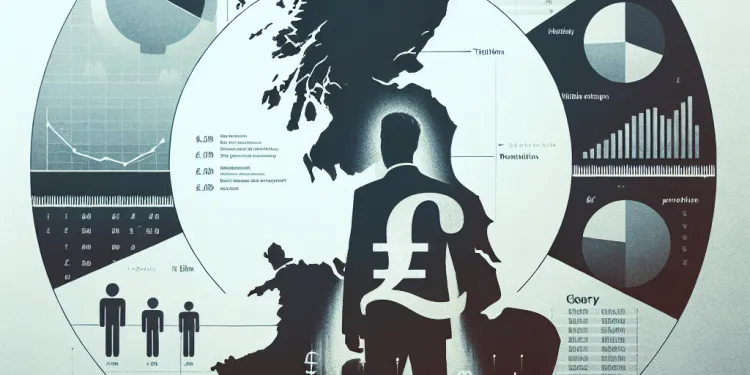
Find A Professional
More Items From Ergsy search
-

Would a wealth tax replace other taxes in the UK?
Relevance: 100%
-

What is the wealth tax in the UK?
Relevance: 92%
-

Could a wealth tax encourage tax avoidance?
Relevance: 92%
-

What is the Wealth Tax in the UK?
Relevance: 87%
-

How do other countries implement a wealth tax?
Relevance: 80%
-

How might a wealth tax impact inequality in the UK?
Relevance: 79%
-

Has the UK ever had a wealth tax?
Relevance: 79%
-

Could a wealth tax affect economic growth in the UK?
Relevance: 79%
-

Has any political party in the UK supported a wealth tax?
Relevance: 79%
-

Why doesn't the UK have a wealth tax?
Relevance: 78%
-

Would a wealth tax apply to foreign assets?
Relevance: 72%
-

What arguments are made for a wealth tax in the UK?
Relevance: 70%
-

Do unpaid tax debts affect Inheritance Tax calculations?
Relevance: 66%
-

What are the administrative costs of a wealth tax?
Relevance: 65%
-

What are the challenges of implementing a wealth tax?
Relevance: 65%
-

How does council tax relate to wealth in the UK?
Relevance: 61%
-

Higher Income Tax - How to Claim Pension Tax Relief | Extra 20% Boost
Relevance: 59%
-

What Happens to Tax Debt After Death? (UK Laws)
Relevance: 55%
-

What is the role of an executor in handling tax debts?
Relevance: 54%
-

Are these grants taxable?
Relevance: 53%
-

Can the executor use the deceased's assets to pay tax debts?
Relevance: 50%
-

What happens to a deceased’s Income Tax if they were employed?
Relevance: 48%
-

What taxes need to be paid from the deceased’s estate?
Relevance: 46%
-

Who is responsible for paying the deceased’s tax debts?
Relevance: 46%
-

What should I do if I need help managing the tax affairs of the deceased?
Relevance: 44%
-

Is it necessary to complete a final tax return for the deceased?
Relevance: 44%
-

Do I need to report the Winter Fuel Payment on my tax return?
Relevance: 38%
-

What taxes in the UK target wealth?
Relevance: 35%
-

What is inheritance tax in the UK?
Relevance: 35%
-

Do I need to pay tax on the £500 cost of living payment?
Relevance: 34%
-

Is the Winter Fuel Payment taxable?
Relevance: 34%
-

Do public opinion polls support a wealth tax in the UK?
Relevance: 29%
-

What Happens To Investments and Pensions | Moving Abroad | Leaving the UK
Relevance: 25%
-

What if the estate does not have enough assets to pay all tax debts?
Relevance: 25%
-

How do I notify HMRC of someone’s death?
Relevance: 25%
-

How is Inheritance Tax (IHT) dealt with after death?
Relevance: 22%
-

Do I need to inform HMRC about the death?
Relevance: 20%
-

What Is An ISA UK (Should I have an ISA & Different Types Of ISAs)
Relevance: 20%
-

Boost your Take Home Pay | Salary Sacrifice Explained UK
Relevance: 19%
-

Are beneficiaries responsible for the deceased's tax debts?
Relevance: 18%
Introduction to Wealth Tax
A wealth tax is a levy on the total value of personal assets, including things like real estate, cash, investments, and other owned assets. The concept has gained attention globally as governments seek ways to address increasing income inequality and fund public spending. In the UK, discussions around wealth tax implementation highlight both potential benefits and significant challenges.
Valuation of Assets
One of the primary challenges in implementing a wealth tax is accurately valuing an individual's total assets. Unlike income, which can be more straightforward to calculate, the valuation of assets such as property, artwork, and private businesses can be complex and subjective. Fluctuations in market conditions can further complicate valuations, potentially leading to disputes and the need for frequent re-evaluations.
Administrative Costs
Administering a wealth tax requires substantial resources. The government would need to establish a system for tracking and assessing the wealth of individuals, which could be both costly and cumbersome. Ensuring compliance would likely involve significant investment in personnel and technology to monitor and enforce tax obligations, and these costs may offset some of the tax revenues collected.
Avoidance and Evasion
High-net-worth individuals may employ various strategies to minimize their tax liabilities, including transferring assets to family members, establishing trusts, or relocating to jurisdictions with more favorable tax environments. Such avoidance and evasion practices undermine the effectiveness of a wealth tax and could necessitate substantial anti-avoidance measures, complicating the tax code further.
Economic Impact
Critics argue that a wealth tax might discourage investment and savings, potentially impacting economic growth. If high-net-worth individuals choose to expatriate or alter their investment behaviors to avoid the tax, this could lead to decreased domestic investment and slower economic expansion. Additionally, some may argue that significant wealth redistribution might create uncertainty in financial markets.
Political and Social Challenges
Implementing a wealth tax involves considerable political challenges. Policymakers must balance public opinion, interest groups, and economic implications. There's often debate about the fairness and effectiveness of such a tax, with opponents arguing that it penalizes success and entrepreneurship. Achieving consensus in a politically diverse environment can be daunting.
Conclusion
While the idea of a wealth tax presents an attractive solution for reducing inequality and raising government revenues, it is fraught with challenges. Accurate asset valuation, high administrative costs, potential for tax avoidance, and economic disincentives are hurdles that must be carefully addressed. Additionally, the political landscape and societal attitudes towards wealth and taxation require careful navigation to implement an effective and equitable wealth tax regime in the UK.
Frequently Asked Questions
What is a wealth tax?
A wealth tax is a tax levied on the net worth of an individual or family, typically targeted at the very wealthy.
What are the common challenges in measuring net worth for a wealth tax?
Challenges include accurately valuing assets such as real estate, businesses, art, and other non-liquid assets.
How might individuals avoid or minimize wealth tax liabilities?
Individuals may use strategies like tax avoidance through offshore accounts, trusts, or through gifting and other financial planning mechanisms.
What administrative challenges exist for implementing a wealth tax?
Significant resources are needed to assess, value, and monitor assets regularly, which can be complex and costly.
How do liquidity issues impact the implementation of a wealth tax?
Taxpayers with high net worth but low liquid assets may struggle to pay taxes without selling valuable assets.
What legal challenges could arise from implementing a wealth tax?
Legal challenges could include questions about the constitutionality of the tax or specific valuation and enforcement mechanisms.
How do international wealth taxes impact the decision to implement one locally?
Comparing other countries' wealth taxes can offer insights but also highlight capital flight risks if rates differ significantly.
What political challenges are associated with implementing a wealth tax?
Significant opposition from wealthy individuals and lobbying groups may slow or prevent legislative processes.
How do differences in asset valuation affect wealth tax implementation?
Variability in asset valuation approaches can lead to disputes and inconsistency in tax assessments.
What role does public opinion play in the implementation of a wealth tax?
Public support or opposition can influence policymakers' willingness to legislate wealth taxes.
How might a wealth tax affect economic growth?
Potential impacts include reduced investment incentives, as wealth holders may change behavior to minimize taxation.
What are the enforcement challenges of a wealth tax?
Enforcement is complicated by international jurisdictions, asset concealment, and limited tax authority resources.
How could a wealth tax impact wealth distribution?
A wealth tax could reduce wealth inequality by redistributing resources from the wealthy to government programs.
Are there any privacy concerns with implementing a wealth tax?
Collecting detailed financial information from individuals could raise concerns about data privacy and security.
How do economic fluctuations impact wealth tax assessments?
Valuations can be unstable in volatile markets, affecting the accuracy of assessments and taxpayer liabilities.
What are the effects of a wealth tax on tax compliance?
High rates or complex regulations could lead to lower compliance and increased tax avoidance.
How do existing taxes interact with a proposed wealth tax?
It's important to analyze interactions to prevent double taxation or undue burden on taxpayers.
What technological challenges exist in implementing a wealth tax?
Developing robust systems to manage, track, and audit assets is technologically demanding and costly.
How does a wealth tax compare to other forms of taxation in terms of revenue generation?
While potentially substantial, wealth tax revenues might be less predictable and stable compared to income or consumption taxes.
What lessons can be learned from countries with existing wealth taxes?
Reviewing countries with wealth taxes can provide insights into best practices and common pitfalls in implementation.
Useful Links
- Ergsy carfully checks the information in the videos we provide here.
- Videos shown by Youtube after a video has completed, have NOT been reviewed by ERGSY.
- To view, click the arrow in centre of video.
- Most of the videos you find here will have subtitles and/or closed captions available.
- You may need to turn these on, and choose your preferred language.
- Go to the video you'd like to watch.
- If closed captions (CC) are available, settings will be visible on the bottom right of the video player.
- To turn on Captions, click settings .
- To turn off Captions, click settings again.
More Items From Ergsy search
-

Would a wealth tax replace other taxes in the UK?
Relevance: 100%
-

What is the wealth tax in the UK?
Relevance: 92%
-

Could a wealth tax encourage tax avoidance?
Relevance: 92%
-

What is the Wealth Tax in the UK?
Relevance: 87%
-

How do other countries implement a wealth tax?
Relevance: 80%
-

How might a wealth tax impact inequality in the UK?
Relevance: 79%
-

Has the UK ever had a wealth tax?
Relevance: 79%
-

Could a wealth tax affect economic growth in the UK?
Relevance: 79%
-

Has any political party in the UK supported a wealth tax?
Relevance: 79%
-

Why doesn't the UK have a wealth tax?
Relevance: 78%
-

Would a wealth tax apply to foreign assets?
Relevance: 72%
-

What arguments are made for a wealth tax in the UK?
Relevance: 70%
-

Do unpaid tax debts affect Inheritance Tax calculations?
Relevance: 66%
-

What are the administrative costs of a wealth tax?
Relevance: 65%
-

What are the challenges of implementing a wealth tax?
Relevance: 65%
-

How does council tax relate to wealth in the UK?
Relevance: 61%
-

Higher Income Tax - How to Claim Pension Tax Relief | Extra 20% Boost
Relevance: 59%
-

What Happens to Tax Debt After Death? (UK Laws)
Relevance: 55%
-

What is the role of an executor in handling tax debts?
Relevance: 54%
-

Are these grants taxable?
Relevance: 53%
-

Can the executor use the deceased's assets to pay tax debts?
Relevance: 50%
-

What happens to a deceased’s Income Tax if they were employed?
Relevance: 48%
-

What taxes need to be paid from the deceased’s estate?
Relevance: 46%
-

Who is responsible for paying the deceased’s tax debts?
Relevance: 46%
-

What should I do if I need help managing the tax affairs of the deceased?
Relevance: 44%
-

Is it necessary to complete a final tax return for the deceased?
Relevance: 44%
-

Do I need to report the Winter Fuel Payment on my tax return?
Relevance: 38%
-

What taxes in the UK target wealth?
Relevance: 35%
-

What is inheritance tax in the UK?
Relevance: 35%
-

Do I need to pay tax on the £500 cost of living payment?
Relevance: 34%
-

Is the Winter Fuel Payment taxable?
Relevance: 34%
-

Do public opinion polls support a wealth tax in the UK?
Relevance: 29%
-

What Happens To Investments and Pensions | Moving Abroad | Leaving the UK
Relevance: 25%
-

What if the estate does not have enough assets to pay all tax debts?
Relevance: 25%
-

How do I notify HMRC of someone’s death?
Relevance: 25%
-

How is Inheritance Tax (IHT) dealt with after death?
Relevance: 22%
-

Do I need to inform HMRC about the death?
Relevance: 20%
-

What Is An ISA UK (Should I have an ISA & Different Types Of ISAs)
Relevance: 20%
-

Boost your Take Home Pay | Salary Sacrifice Explained UK
Relevance: 19%
-

Are beneficiaries responsible for the deceased's tax debts?
Relevance: 18%